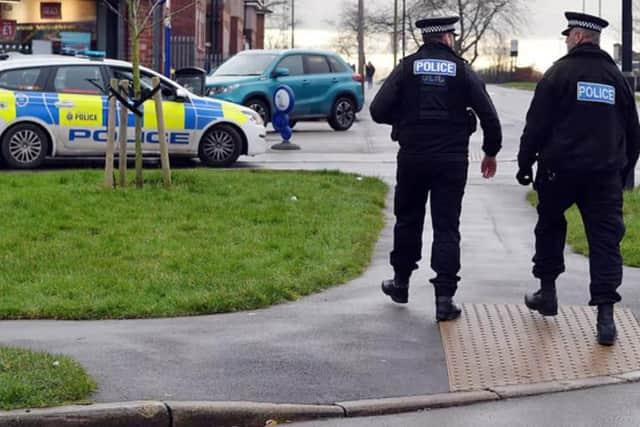South Yorkshire Police: This is how officers have been punished for misconduct
and live on Freeview channel 276
The cases include one involving a fatal crash and another relating to a teenage sex assault victim’s suicide.
Data looking at the effectiveness of the IOPC
They are outlined in recently released data concerning the effectiveness of police watchdog The Independent Office for Police Conduct (IOPC), and including the outcome of every published misconduct hearing since it came into being in April 2018.


Advertisement
Hide AdAdvertisement
Hide AdWhile most police complaints are dealt with by the force itself, the most serious cases are referred to the IOPC. This is either done by the force in question or the IOPC itself, which can call in an investigation if it has not been referred to by the force.
Guidance from the College of Policing states that the purpose of misconduct proceedings is to: maintain public confidence in and the reputation of the police service; uphold high standards in policing and deter misconduct; and to protect the public.
Six South Yorkshire Police officers found to have misconduct case to answer
Since the IOPC’s inception, six South Yorkshire Police (SYP) officers have been found to have a misconduct case to answer. Of those six officers, four were made subject to management action and two were given a written warning.


The data reveals how the case of one of the six SYP officers proved to have committed misconduct concerns a teenage girl who made an allegation of sexual assault to the force.
Advertisement
Hide AdAdvertisement
Hide AdShe killed herself in November 2018, just over six months after the force ‘decided there was no realistic prospect of a conviction’ and dropped the case against her alleged attacker.
The IOPC investigation report into the case detailed how the girl’s stepfather felt SYP had failed to ‘adequately investigate’ the allegations and had also failed to provide his stepdaughter with the ‘necessary safeguarding measures’ to support and protect her.
He said these failings had led to a ‘deterioration of her mental health’, and he believed them to be a ‘contributory factor’ in her death.
The IOPC found that one of the investigating officers ‘may have acted outside local policy and procedure and national guidance’ in the sex offence probe; and when its report was shared with SYP, the force agreed that the officer in question had a misconduct case to answer to.
Advertisement
Hide AdAdvertisement
Hide AdThe hearing determined that misconduct was found for three alleged breaches of the police Standards of Professional Behaviour (SoPB), and the officer was given a sanction of a final written warning.
New watchdog promised to deliver ‘greater accountability to the public’
The IOPC replaced the Independent Police Complaints Commission (IPCC) in January 2018, as part of a reform which promised to ‘ensure greater accountability to the public’.
Unlike its predecessor, the IOPC was given the power to initiate its own investigations into complaints of police conduct and investigate chief officers and carry them out without them being managed or supervised by the constabulary under scrutiny.
Despite the changes to the police watchdog's remit, the data shows that, nationally, the most common outcome for officers with a misconduct case to answer is no further action.
Advertisement
Hide AdAdvertisement
Hide Ad43 per cent (105 of the 244) officers identified by the IOPC as having a case to answer received that sanction.
Of those 244 officers, 20 had left the force before their hearings were heard, but the majority (77, or 73 per cent of the 105) were found not guilty by a force panel.
Some 36 per cent of the remaining officers received management action; 16 per cent received a written warning and four per cent were dismissed.
‘Lack of punishment risks undermining confidence in policing’
Questions have been asked about whether the IOPC has fulfilled its objective to speed up investigations, make them more independent and improve justice.
Advertisement
Hide AdAdvertisement
Hide AdThe Home Affairs Select Committee launched a new inquiry into the effectiveness of the IOPC at the start of 2021.
Deborah Coles, executive director of INQUEST, spoke at the first hearing in January. The charity provides expertise on state-related deaths and their investigation.
She told the committee that sanctions against police officers were too rare and the lack of punishment risked undermining confidence in policing.
This criticism, she said, also extended to the fact that very few serving police officers had faced criminal proceedings for alleged offences carried out in the line of duty.
South Yorkshire Police officer killed pedestrian while speeding
Advertisement
Hide AdAdvertisement
Hide AdA South Yorkshire Police officer who killed a pedestrian while speeding as he drove to a ‘pre-diaried appointment’ avoided being charged by the Crown Prosecution Service (CPS) and the force downgraded his case from gross misconduct to misconduct.
Misconduct means a breach in standards, while gross misconduct means a breach in standards which is so serious that dismissal would be justified.
The crash took place in Sheffield in November 2017, while the officer in question was driving a liveried police vehicle.
The IOPC investigation report, published in July 2018, states that the officer was found to be speeding, travelling 42mph on a road with a 30mph speed limit.
Advertisement
Hide AdAdvertisement
Hide AdAfter reviewing the evidence, an investigator concluded that the officer may have a case to answer for gross misconduct and referred the case to the CPS for them to consider charging the officer with offences including causing death by dangerous driving and causing death by driving without due care and attention.
Two CPS prosecutors reviewed the case and concluded that there was ‘no realistic prospect of conviction for any offence’. After reading the IOPC report and in light of the CPS desicion, South Yorkshire Police determined that the officer had a case of misconduct, and not gross misconduct, to answer to.
The hearing determined that the officer’s misconduct had been proven, and he was sanctioned with management advice, and a requirement to attend a driver training course.
Misconduct cases should be considered disciplinary matter
A 2020 public disclosure by the IOPC revealed that, of the 432 individuals referred to the CPS investigators since 2018, the CPS decided to prosecute just 77 (18 per cent).
Advertisement
Hide AdAdvertisement
Hide AdIOPC guidance introduced in 2020 states that a misconduct case should be considered a disciplinary matter that would ‘warrant at least a written warning’.